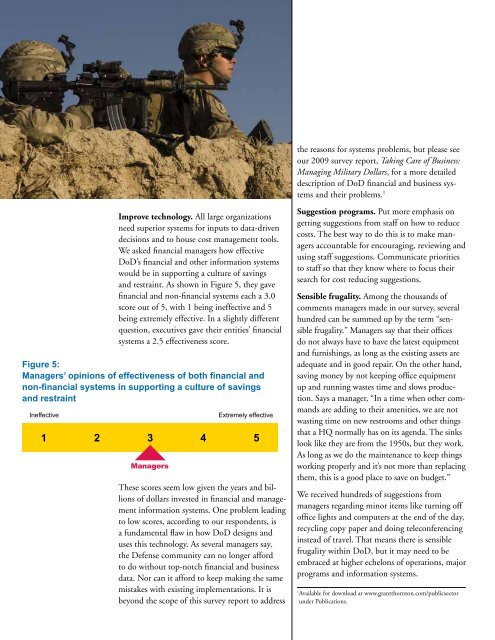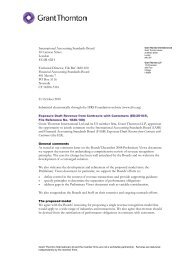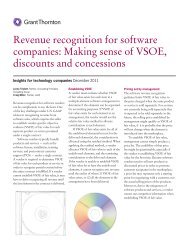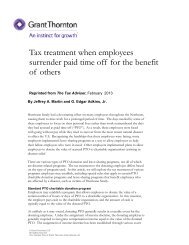COST WArriOrS - Grant Thornton
COST WArriOrS - Grant Thornton
COST WArriOrS - Grant Thornton
Create successful ePaper yourself
Turn your PDF publications into a flip-book with our unique Google optimized e-Paper software.
22<br />
the reasons for systems problems, but please see<br />
our 2009 survey report, Taking Care of Business:<br />
Managing Military Dollars, for a more detailed<br />
description of DoD financial and business systems<br />
and their problems. 1<br />
Improve technology. All large organizations<br />
need superior systems for inputs to data-driven<br />
decisions and to house cost management tools.<br />
We asked financial managers how effective<br />
DoD’s financial and other information systems<br />
would be in supporting a culture of savings<br />
and restraint. As shown in Figure 5, they gave<br />
financial and non-financial systems each a 3.0<br />
score out of 5, with 1 being ineffective and 5<br />
being extremely effective. In a slightly different<br />
question, executives gave their entities’ financial<br />
systems a 2.5 effectiveness score.<br />
Figure 5:<br />
Managers’ opinions of effectiveness of both financial and<br />
non-financial systems in supporting a culture of savings<br />
and restraint<br />
Ineffective<br />
Managers<br />
Extremely effective<br />
1 2 3 4 5<br />
These scores seem low given the years and billions<br />
of dollars invested in financial and management<br />
information systems. One problem leading<br />
to low scores, according to our respondents, is<br />
a fundamental flaw in how DoD designs and<br />
uses this technology. As several managers say,<br />
the Defense community can no longer afford<br />
to do without top-notch financial and business<br />
data. Nor can it afford to keep making the same<br />
mistakes with existing implementations. It is<br />
beyond the scope of this survey report to address<br />
Suggestion programs. Put more emphasis on<br />
getting suggestions from staff on how to reduce<br />
costs. The best way to do this is to make managers<br />
accountable for encouraging, reviewing and<br />
using staff suggestions. Communicate priorities<br />
to staff so that they know where to focus their<br />
search for cost reducing suggestions.<br />
Sensible frugality. Among the thousands of<br />
comments managers made in our survey, several<br />
hundred can be summed up by the term “sensible<br />
frugality.” Managers say that their offices<br />
do not always have to have the latest equipment<br />
and furnishings, as long as the existing assets are<br />
adequate and in good repair. On the other hand,<br />
saving money by not keeping office equipment<br />
up and running wastes time and slows production.<br />
Says a manager, “In a time when other commands<br />
are adding to their amenities, we are not<br />
wasting time on new restrooms and other things<br />
that a HQ normally has on its agenda. The sinks<br />
look like they are from the 1950s, but they work.<br />
As long as we do the maintenance to keep things<br />
working properly and it’s not more than replacing<br />
them, this is a good place to save on budget.”<br />
We received hundreds of suggestions from<br />
managers regarding minor items like turning off<br />
office lights and computers at the end of the day,<br />
recycling copy paper and doing teleconferencing<br />
instead of travel. That means there is sensible<br />
frugality within DoD, but it may need to be<br />
embraced at higher echelons of operations, major<br />
programs and information systems.<br />
1<br />
Available for download at www.grantthornton.com/publicsector<br />
under Publications.
















